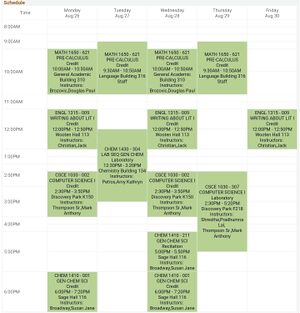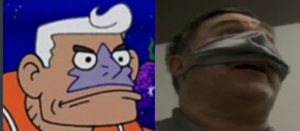Difference between revisions of "Courses"
(English -> ENGL) |
(History is second year. Physics is second year) |
||
| Line 92: | Line 92: | ||
== HIST == | == HIST == | ||
| + | During your second year at TAMS, you will take two semesters of U.S. history. | ||
=== HIST 2610 === | === HIST 2610 === | ||
| Line 150: | Line 151: | ||
== PHYS == | == PHYS == | ||
| + | During your second year at TAMS, you will take two semesters of physics. Most people start with PHYS 1710 and 1730, but if you scored a 5 on both AP Physics C exams including mechanics and electricity and magnetism, you can enroll in modern physics (PHYS 3010 and Lab: PHYS 3030) and Quantum mechanics (PHYS 4310). | ||
=== PHYS 1710 === | === PHYS 1710 === | ||
| Line 164: | Line 166: | ||
=== PHYS 3010 === | === PHYS 3010 === | ||
| − | Modern Physics | + | Modern Physics. Special class #1 for 1 [[Preston Tranbarger|special kid]]. |
=== PHYS 3030 === | === PHYS 3030 === | ||
| − | Modern Physics Lab | + | Modern Physics Lab. This is the lab for PHYS 3010. |
=== PHYS 4310 === | === PHYS 4310 === | ||
Revision as of 12:08, 5 February 2021
Academics are important. Don't fail your classes. Listed before are common courses which TAMS students take. However, TAMS students are allowed to take any UNT Course listed on the UNT Catalog as long as the student meets the pre-requisites.
BIOL
does anyone know any bio kids
every1ne hates crossly biogoly
CHEM
CHEM 1410
General Chemistry I. sucks to suck
http://catalog.unt.edu/preview_course_nopop.php?catoid=20&coid=75346
CHEM 1413
Honors Chemistry I. acree moments
http://catalog.unt.edu/preview_course_nopop.php?catoid=20&coid=75348
CHEM 1420
General Chemistry II. This class is amazing with Kelber.
http://catalog.unt.edu/preview_course_nopop.php?catoid=22&coid=83777
CHEM 1423
Honors Chemistry II. acree 2 electric boogaloo
http://catalog.unt.edu/preview_course_nopop.php?catoid=22&coid=83779
CHEM 2730
Organic Chemistry (OChem). Organic chemistry is just naming carbons and realizing how carbons flirt with each other.
http://catalog.unt.edu/preview_course_nopop.php?catoid=20&coid=75356
First Year CSCE Courses
CSCE 1030
see pless pless. Taught by Dr. Pradhumna Shrestha during the fall semester of the 2020-2021 school year.
http://catalog.unt.edu/preview_course_nopop.php?catoid=20&coid=75513
CSCE 1040
obgekt oreeentid prougramyng. Taught by Dr. David Mark Keathly, who does not know how to wear a mask. Notorious for long, tedious projects.
http://catalog.unt.edu/preview_course_nopop.php?catoid=20&coid=75515
Second Year CSCE Courses
CSCE 2100
theoretical
http://catalog.unt.edu/preview_course_nopop.php?catoid=20&coid=75518
CSCE 2110
bad class
http://catalog.unt.edu/preview_course_nopop.php?catoid=20&coid=75519
CSCE Related Courses
INFO 3010
Intro to Data Science is taught in R and is project based meaning that there are no tests. The course covers the entirety of data science including how to gather, parse, analyze, graph, and interpret data.
http://catalog.unt.edu/preview_course_nopop.php?catoid=22&coid=87512
ENGL
First Year ENGL Courses
ENGL 1315
ENGL 1315 is taken first semester. Current instructors include Dr. Anne Schoolfield, Professor Joshua Ibarra, and Dr. Mariah Steele. Previous instructors include Professor Jack Christian. The class covers poetry and plays.
http://catalog.unt.edu/preview_course_nopop.php?catoid=20&coid=75850
ENGL 1325
ENGL 1315 2: Electric Boogaloo is taught by the same professors as ENGL 1315. However, unlike with math classes, you are able to switch professors. The class covers science fiction and prose.
http://catalog.unt.edu/preview_course_nopop.php?catoid=20&coid=75854
Second Year ENGL Courses
ENGL 4680
The course is taught by Dr. Marshall Needleman Armintor. The purpose of this course is to examine the concept of narrative in video games—from all eras and genres—to show how the familiar questions of structure, cultural critique, and (especially) intertextuality commonly applied to literature and film can be extended to games and the gaming ethos.
http://catalog.unt.edu/preview_course_nopop.php?catoid=23&coid=95160
HIST
During your second year at TAMS, you will take two semesters of U.S. history.
HIST 2610
United States History to 1865. American History to 1865 A.D.
HIST 2620
United States History since 1865. American History since 1865 A.D.
LTEC
LTEC 3000
Learning Technologies in STEM. This class is largely composed of busy work. Not an easy A despite being composed of busy work. This is a course to avoid.
MATH
Note: If you place into MATH 1650 or 1710, the math professor you take during your first year first semester at TAMS will be the same for the first year second semester. For example, if you take Mann first semester for Cal I, you will have him again second semester for Cal II.
MATH 1650
Pre-calculus. Taught by Dr. Nirmala Naresh, Dr. Joe Iaia, and Dr. Doug Brozovic for the fall semester of the 2020-2021 school year. Often considered to be more difficult than high school pre-calculus.
MATH 1710
Calculus 1. Covers limits and continuity, derivatives and integrals; differentiation and integration of polynomial, rational, trigonometric, and algebraic functions; applications, including slope, velocity, extrema, area, volume and work. Was taught by Dr. Allen Mann and Dr. William Cherry for the fall semester of the 2020-2021 school year. If you take this course in spring of your junior year, you will have the same professor you did for MATH 1650.
MATH 1720
Calculus 2. Covers differentiation and integration of exponential, logarithmic and transcendental functions; integration techniques; indeterminate forms; improper integrals; area and arc length in polar coordinates; infinite series; power series; Taylor’s theorem. Was taught by Dr. Matthew Dulock for the fall semester of the 2020-2021 school year. If you take this course in spring of your junior year, you will have the same professor you did for MATH 1710.
MATH 2000
discreeet.. fishmen..
MATH 2700
Matrix math. Learning how to solve and manipulate systems of linear equations and apply it to real life situations. Just like your SAT system of equations but when the equations do not play nice, then you get all sad. The first unit covers what happens when the system has a solution and the last 3 units cover what happens when the system does not have a happy solution along with some other theorems and techniques. Some things covered are vector operations, Gaussian elimination, determinants, change of basis, Gram-Schmidt process, eigenvectors, and diagonalization.
MATH 2730
Calculus 3. Covers vectors and analytic geometry in 3-space; partial and directional derivatives; extrema; double and triple integrals and applications; cylindrical and spherical coordinates. If you take MATH 1720 in fall of your junior year, you will be required to take this class in spring.
MATH 3000
real anal. its hard
MATH 3400
number theory
MATH 3410
You solve differential equations using a box full of tools and methods. Good calculus and algebra fundamentals recommended. This course resembles more of calculus 2 than calculus 1 or 3 so be prepared.
MATH 3420
diffeeks deux
MATH 3680
applyed statisticks
MATH 3510
Abstract Algebra I. This class mainly covers the study of groups, fields, and rings. Some of the notable topics include: permutation groups, dihedral groups, cyclic groups, alternating groups, left and right cosets, LaGrange's Theorem, finitely generated abelian groups, homomorphisms, factor groups, rings, fields, and Fermat's Theorem.
MATH 4520
complex anal
MATH 4810
Biocomputing. Easily the best math class since you only need MATH 1720 as the prerequisite and no math is done in the class. Instead you just learn biology, computer science, and how to present papers.
PHYS
During your second year at TAMS, you will take two semesters of physics. Most people start with PHYS 1710 and 1730, but if you scored a 5 on both AP Physics C exams including mechanics and electricity and magnetism, you can enroll in modern physics (PHYS 3010 and Lab: PHYS 3030) and Quantum mechanics (PHYS 4310).
PHYS 1710
Kinematics with calculus. If you took AP Physics 1 or C then this will be familiar territory.
PHYS 1730
physics 1 lab
PHYS 2220
Electromagnetism. If you took AP Physics C then this will also be familiar territory.
PHYS 2240
physics 2 lab
PHYS 3010
Modern Physics. Special class #1 for 1 special kid.
PHYS 3030
Modern Physics Lab. This is the lab for PHYS 3010.
PHYS 4310
Quantuum mekaniks. If PHYS 3010 is opened up to more students in the future years this class will become accessible to some during their time at TAMS. It requires a student to take both PHYS 3010 and 3030 in addition to MATH 3410 prior to enrollment. Special class #2 for 1 special kid.
PSCI
PSCI 2305
PSCI 2306
TECM
Technical writing. Required for certain tracks for the class of 2023 and onwards.
Electives
During your second semester of junior year, you are able to take electives as long as you meet the GPA requirement.
Some common electives that TAMS students take include:

